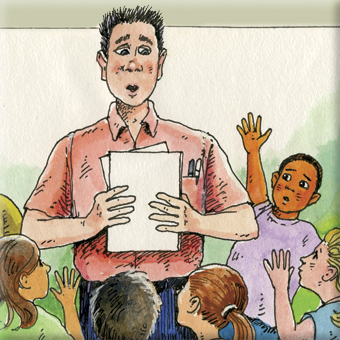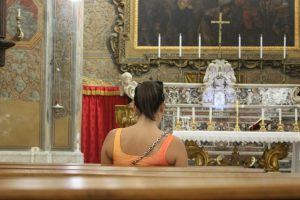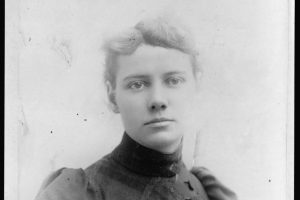Catholic schools are filling in the teacher gap with new grads looking for a challenge.
Elias Moo could be parlaying the University of Notre Dame degree he earned in 2007 into a lucrative career. Instead, the 24-year-old has spent the last two years living in Denver's inner city with four others who share his passion: serving as a teacher, spiritual guide, and role model for children in Catholic schools.
Moo (pronounced moe) taught fifth grade at St. Rose of Lima Catholic School, where nearly all of the students are Hispanic, predominantly from low-income families. He was paid a $1,000 monthly stipend, but he doubts he could have felt more fulfilled.
He speaks proudly of how his father, who worked his way up from a 17-year-old field laborer in Oxnard, California to his current position as quality control manager at San Miguel Produce, made sure that Elias and his four younger siblings attended Catholic schools. Elias pieced together just enough scholarships, grants, and loans to make his way through Notre Dame.
"I am a product of Catholic schools," Moo says. "Both of my parents are immigrants from Mexico and they've been working their whole lives for us to have a Catholic education. I feel a special connection to that. I feel like I'm giving back and being a part of giving these kids a sense of hope . . . kids who struggle socially, economically, emotionally."
Moo is hardly alone in his idealism and eagerness to serve, and the nation's financially strapped Catholic schools are happy to oblige. He is one of a growing number of young adults who, lacking traditional education degrees or licenses, largely donate two years of their time to teach in hard-to-staff Catholic schools while taking courses at night or over the summer to become certified teachers.
More public schools in underserved urban and rural areas also are tapping this resource. The movement of volunteer teachers in Catholic schools mirrors Teach for America, which will place 4,100 new teachers this fall in public schools in low-income communities across the country.
It would be wrong to characterize Catholic schools' demand for young teachers as strictly financial, says Karen Ristau, president of the National Catholic Educational Association. Service teachers, she acknowledges, "are a wonderful supplement that have become essential in many poor schools."
Classroom experiments
Diocesan leaders and school administrators have long since stopped mourning the bygone era of sisters staffing schools. The future of Catholic schools, they realize, lies in attracting and hanging on to young, talented lay teachers.
It's a battle not without its challenges. Inexperienced teachers must learn on the job. Those who stay on for a few years often find it difficult to live on the relatively low pay. Turnover in many urban Catholic schools is high.
But many school and university officials, and the service teachers themselves, say they believe the grand experiment is largely succeeding.
Shane Martin, dean of the school of education at Loyola Marymount University in Los Angeles, said the university's service teacher program, Partners in Los Angeles Catholic Education (PLACE), has made a huge impact on area schools. Its 50 graduate-level service teachers live together in former convents while they teach.
"I think we have a very important obligation to help Catholic schools any way we can," Martin says. "For me what's most exciting about it is it's the full package-spirituality, academics, and living in community."
Martin credits Notre Dame's Alliance for Catholic Education (ACE) program, the nation's first and largest Catholic service teacher program-and the one that placed Moo at St. Rose of Lima-with pioneering the concept.
Father Tim Scully, C.S.C., now executive vice-president of Notre Dame, and Father Sean McGraw, C.S.C., then a former student of Scully's, founded ACE in 1993 to help staff schools in dire need of teachers, especially in the South and Southwest.
"Word spread that these teachers were doing well," says John Staud, ACE director. "Principals and superintendents were saying, ‘We want some of these teachers too.'
"These are really, really smart people, and they are highly motivated with a strong desire to serve kids and make a difference. A lot of times they become the best teachers in their school, and we hound them if they don't."
With their own success taking hold, ACE encouraged other Catholic colleges to launch their own programs. The University Consortium for Catholic Education was born and now includes 14 institutions of higher learning.
To maintain the program's sense of "togetherness," ACE has capped enrollment at 180 students per year, meaning many applicants are turned away.
Pat Manning, 24, counts himself as one of the fortunate Notre Dame graduates to have been admitted after earning a bachelor's degree in theology and liberal studies. As graduation neared, he felt called to somehow serve others, and he had remembered hearing in high school a CD of U2 in concert in which Bono was praising ACE's works.
In spring 2009 Manning completed his two years of service teaching at Bishop Byrne High School in Memphis, an inner-city school where 90 percent of the students are African American and most are from low-income families.
"It's maybe the most difficult thing I've ever done, and certainly one of the most frustrating," Manning says. "But it has been an excellent experience."
Trial by fire
Having been forewarned that "flexibility is the name of the game," Manning says he tried to temper his expectations, but he was still caught off guard.
"I was surprised not only by how bad these kids were academically, but I also was struck by their extreme apathy," he recalls. "Getting an F didn't bother these kids at all."
The school's financial situation worsened during the time he was there. "We were coming up on midterm exams, and we didn't have any paper for the copier," he says. "They were very, very understaffed."
Manning plans to return to graduate school this fall and work toward a theology degree, with a long-term goal of pursuing a career in Catholic schools, either teaching or in an administrative position. He is "very encouraged by this movement."
"It is young, talented individuals getting exposed to these problems at Catholic schools," he says. "They may not all stay, but it stays with them as they continue to contribute in some capacity."
Nationally there is scant research on how many service teachers continue to teach in Catholic schools. ACE officials say 70 percent of their alumni still work in education, although that includes public schools and institutions of higher learning. Of the 32 graduates from that first ACE cohort in 1996, 18 still work in education, but only five teach in Catholic schools.
Brynn Johnson, 24, an ACE teacher who just finished her second year of service teaching fourth grade at Holy Family Elementary in Birmingham, Alabama, isn't sure where she will be in the fall, but she plans to continue teaching, despite a difficult first year.
"It's a good thing it's a two-year program," says Johnson, who earned a bachelor's degree in anthropology from Notre Dame. "If it had only been one year, I think I would have felt overwhelmed and not even considered staying in education. I did not have a happy face about teaching after my first year."
Johnson says her lack of classroom preparation and difficult unforeseen developments-such as a doubling up on students because the school could not afford a substitute teacher-posed some of her greatest challenges.
ACE teachers student-teach for eight weeks of summer school, but Johnson says traditional four-year undergraduate programs better prepare teachers for their first year.
While Johnson says she's more drawn to social work, she feels her improvements from her first to her second year have encouraged her to teach for at least a few more years.
"Fresh ideas are needed in the classroom," she says. "As long as I'm energized by it, I want to stay with it."
Unprepared for class
Johnson was not alone in feeling unprepared for the classroom. Only 5 percent of ACE teachers surveyed after their first year of service teaching reported feeling "very well prepared," according to a 2005 study by John L. Watzke, adjunct associate professor at Notre Dame's Institute for Educational Initiatives. Another 33 percent felt "well prepared."
But Elizabeth Spitznagel discovered that entering the classroom with a license is no guarantee of preparedness. After graduating with an education degree from Xavier University, Spitznagel volunteered at Chicago's St. Agnes of Bohemia Elementary School through Amate House, a Catholic service program.
"A lot of the students get to see first-year teachers making lots of mistakes," Spitznagel, 23, says, noting the school's high teacher turnover. "I guess we kind of get our kinks out here and then move on, which is sad. The first year is definitely overwhelming."
She felt less guilty about her mistakes after seeing that many St. Agnes eighth graders scored at 10th-grade levels when standardized test scores came back at the end of the year.
"The quality has not suffered, in general, academically," says Msgr. James E. Gilg, superintendent of schools in the Archdiocese of Omaha, of the young teachers in his schools.
The biggest challenge is that some young laypeople aren't always prepared to teach religion, he says. Omaha Catholic schools are increasingly focusing on faith formation for teachers, with mandatory in-service training and optional summer programs.
"That religious consciousness of who they are and what they do is not as obvious as the days when we had more priests and nuns teaching," Gilg says. "I don't mean these lay teachers are bad people. They are very generous people because they are willing to work for less than they could earn at public schools."
A stepping stone
In addition to feeling unprepared, Spitznagel and Johnson agree on something else: They doubt they could afford to live on a Catholic school teacher's pay forever, especially when they start raising families.
Johnson notes that she and another ACE teacher are the only two teachers at Holy Family Elementary who are single and younger than 30. Eight of the school's 13 teachers are retired from Birmingham public schools, so they can supplement their teacher pay with their retirement benefits.
With her master's of education degree and two years of teaching experience, Holy Family would pay Johnson up to $29,900, compared to about $33,000 at a Chicago Catholic school and $50,000 at a Chicago public school, she says of her job offers.
Staud says ACE aims to create long-term Catholic teachers and administrators, but program leaders realize that salary constraints ultimately will drive some down other career paths. That's one reason he would like to see more Catholic colleges and universities launching service teacher programs.
The University Consortium for Catholic Education is producing about 250 service teachers a year, but there are 7,248 Catholic schools nationwide. "There are 220 Catholic universities and colleges in this country, and many of them do nothing," Staud says.
Karen Kennedy, director of Boston College's Urban Catholic Teacher Corps program, is hopeful but realistic about the reach of such programs. "I think it's an important initiative because we're getting young talent," she says. "Even if only half of them stay [in teaching], that's huge. I don't think it's fixing the bigger structural problems, but it's certainly taking a stab at it."
As much as he has loved the experience, Elias Moo, too, says he only sees himself teaching for a few more years. But his role in Catholic education would be far from over.
"My time in the ACE program has inspired me to do more," he says. "I'm feeling it's the beginning of something bigger for me."
That could mean a career in school administration or in the policy-making arena. He is particularly interested in the parental choice movement, an effort to create more federal funding for Catholic school tuition.
"I would be pushing for local, state, and federal governments to realize that Catholic schools are a beacon of hope and are doing a great job of educating those who are disadvantaged."














Add comment